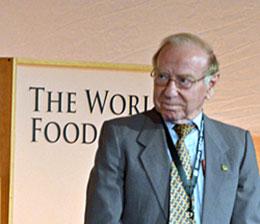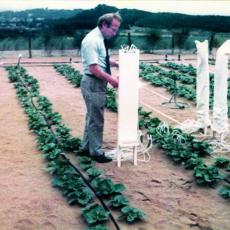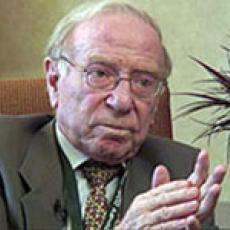Former faculty member wins World Food Prize
The World Food Prize, often referred to as the ‘Nobel Prize for Agriculture’ was awarded to Dr. Daniel Hillel in 2012. Dr. Hillel was a professor of soil physics at UMass Amherst from 1977 to 1993. Dr. Hillel developed the concepts behind drip irrigation and more recently has been investigating agricultural techniques to address climate change. At the awards ceremony, Ban Ki-moon, secretary-general of the United Nations, said: “Instead of waiting for a rainstorm, he had a brainstorm. His work has transcended boundaries to grow ‘more crop per drop’ in some of the driest places on earth.”
Dr. Hillel, born in the United States, spent part of his childhood in the Jezreel and Jordan Valleys of Israel, then Palestine. He returned to Israel in 1951 where he led research in desert ecology and hydrology leading to the development of innovative irrigation systems for producing crops in arid lands. He subsequently has consulted with developing countries around the world, often under the auspices of the Food and Agriculture Organization of the United Nations and the World Bank. Hillel holds a doctorate from the Hebrew University in Jerusalem where he later served as professor and head of the Department of Soil and Water Sciences until 1974.
In awarding the 2012 prize, the World Food Prize Foundation said
“First drawn to the critical needs of the water supply in arid regions during his years of living in a small settlement in the highlands of the Negev Desert, the new approach Dr. Hillel and others developed provided for a low-volume, high-frequency, calibrated water supply to plants. As such, this research led to a dramatic shift from the prevailing method of irrigation used in the first half of the twentieth century: applying water in brief periodic episodes of flooding to saturate the soil, followed by longer periods of manufactured drought to dry out the soil. The new innovative method developed and disseminated by Dr. Hillel applied water in small but continuous amounts directly to the plant roots, with dramatic results in plant production and water conservation.”
While on the faculty at the University of Massachusetts Amherst, Dr. Hillel was awarded the Chancellor’s Medal for exemplary service in 1982. He is a fellow of the American Association for the Advancement of Science, the American Society of Soil Science, and the American Society of Agronomy. He has published several hundred scientific papers and has authored and edited almost 20 books, one of his most recent being Soil in the Environment: Crucible of Terrestrial Life.
In recent years, Hillel’s work has focused on climate change and the potential effects of climate change on agriculture. His most recent book is entitled Handbook of Climate Change and Agroecosystems: Global and Regional Aspects and Implications. In an interview in the November 2012 issue the magazine “CSA [Crops, Soils, Agronomy] News,” Hillel commented “we have to give climate change our attention, devote our research resources to it, and take what action is necessary – first of all, to mitigate or limit climate change and then to adapt to the extent of climate change that is inevitable. Some of it is inevitable, but we can also reduce the severity by limiting the emissions of greenhouse gases… and agriculture is part of that effort. Agriculture emits greenhouse gases by the very fact, for example, that we cultivate soils and deplete organic matter; eradicate and burn vegetation residues; and use energy – that is, fossil fuel – in mechanized agriculture. But agriculture could easily turn into a positive absorber of greenhouse gases instead of a net emitter… We have to change the mode of agriculture so as to trap and sequester carbon in soil and, by so doing, also enrich soil fertility and stability.”


